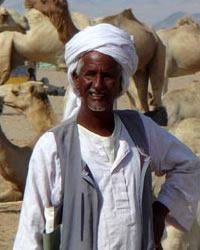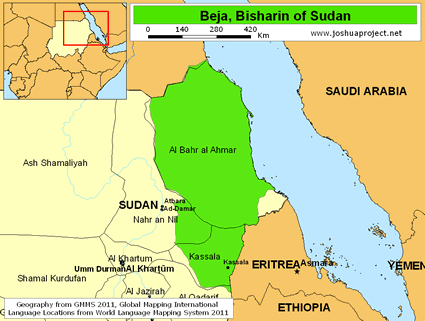The Beja are a nomadic people group with a million and a half members who live in the northeastern portion of the African nation of Sudan. They have subgroups. Among them are the Bisharin.
Eastern Sudan has been the homeland of the Bisharin Beja since the days of the pharaohs 4,000 years ago. Despite contact with the Egyptians, along with Greeks and Romans, it was the Muslims who finally had a real and lasting impression on the Beja. Although the Beja had partially accepted Christianity in 500 A.D., their conversion was only skin deep and beginning in 640 A.D., when Arabs first invaded Sudan, the Beja began to gradually adopt the Islamic faith. The Arabs did not conquer Sudan, and although many Beja tribes still do not speak Arabic, Islam left a lasting impact on their lifestyle, customs and religious practices.
In general, the Bisharin Beja have always rejected authority and they greatly value their nomadic freedom. For the most part they have not changed their lifestyle or practices in the last 1,500 years. Most Bisharin Beja are nomadic herders of camels and goats, although some have adopted sedentary lifestyles in the towns and cities of eastern Sudan. They divide into five distinct clans, and from these clans exist smaller groups of one to ten extended families. The sparse distribution of grazing due to little rainfall isolates the families from one another even more. With no settled homes, they live in tents made from woven palm matting and exist mainly on a diet of milk and grain, supplemented occasionally by meat and sugar.
The Bisharin Beja like to sing and play musical instruments, in particular the rababa, which is similar to a guitar. Since they are renowned camel herders, camels are the most popular subject matter for songs, but many songs also describe the beauty of women or speak about a longing for a special place, such as a village, mountain or good grazing lands.
Coffee, or jabana, is very important to the Bisharin Beja. Drinking coffee involves relaxing with friends and talking. Said one historian, "A Hadendowa [one of the Beja clans] would rather starve than go without coffee."
The Bisharin Beja often marry cousins. After a marriage contract has been made, a large gift of livestock, clothing and other goods is given to the bride's family. The goal of young couples is to have many male children and to acquire a great number of female camels. Only the wealthiest Bisharin Beja have more than one wife. Polygyny is unusual, but sometimes practiced by wealthy men. In this patrilineal society, the birth of a baby boy is greeted with a trill of exaltation or with chanting, while a newborn girl is greeted with silence.
Sharia, or Muslim religious law, is of some importance for settled Bisharin Beja but matters little to the nomads. Salif, customary Beja law, is more important than either Sharia or modern Sudan code law. Salif emphasizes the mandate of hospitality and provides for rates and modes of compensation for all manner of physical injury, ranging from one blow through murder.
Throughout their history, the Beja have practiced several religions, including idolatry, ancestor and demon worship, devotion to Egyptian gods, Jacobite Christianity and now Islam. Although they are Muslims, Islam is not deep rooted or well understood by the Bisharin Beja. They do not make the required pilgrimage to Mecca, and many concerned with the traditional belief of do not say the regular required prayers.
The Bisharin Beja continue to be highly afraid of jinn, or bad spirits, which they believe exist everywhere and cause sickness and accidents maintain peace between individuals. They need the freedom that only Jesus Christ can offer.
Pray for loving and dedicated workers who will lay down their lives for the sake of the gospel in Sudan.
Pray for a “Book of Acts” type of movement to Christ among the Bisharin Beja people in Sudan.
Pray for Bisharin Beja disciples who will disciple others.
Pray for Bisharin Beja elders and family leaders to have dreams of Christ that will lead entire families into faith.
Scripture Prayers for the Beja, Bisharin in Sudan.
https://en.wikipedia.org/wiki/Bishari_tribe
https://web.archive.org/web/20060310191011/http://www.dur.ac.uk/justin.willis/starkey.htm
https://www.britannica.com/topic/Bisharin
https://fanack.com/sudan/society-of-sudan/the-beja-a-long-cultur
| Profile Source: Joshua Project |











